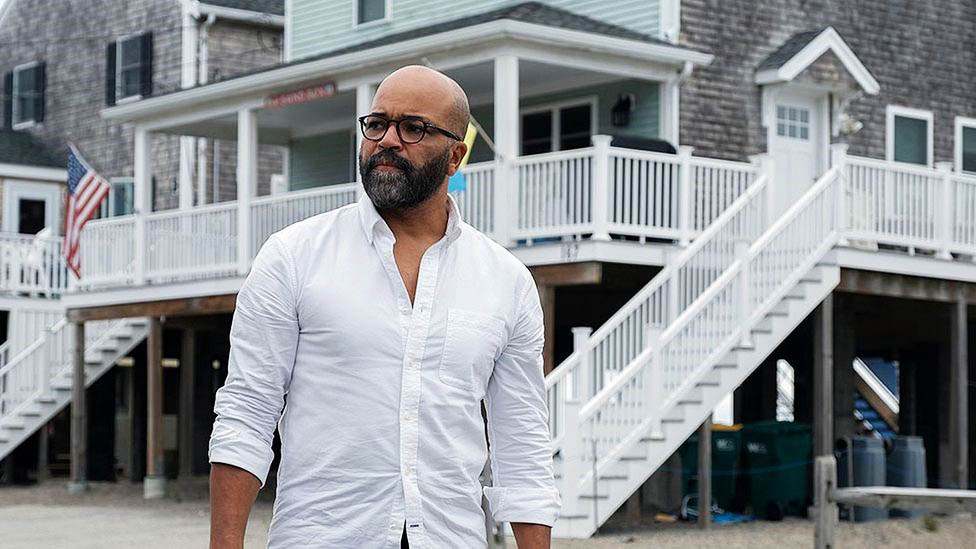(BBC) In a year where many stars stayed away from the Toronto International Film Festival because of the actors’ strike, it meant more focus was on the films, even if many considered this year’s selection less than vintage. Nevertheless, there were a number of breakout movies, including Anna Kendrick’s Woman of the Hour, Azazel Jacobs’ His Three Daughters and Christy Hall’s Daddio – while the clear highlight was Cord Jefferson’s American Fiction, which deservedly won The People’s Choice award, commonly cited as a harbinger for Oscar success. Past winners of the audience-selected prize include subsequent best picture victors Slumdog Millionaire, Green Book, Nomadland, The Kings Speech and 12 Years a Slave.
American Fiction is an adaptation of Percival Everett’s 2001 novel Erasure, a satire on the US publishing industry. It’s a showcase for Jeffrey Wright, who is magnificent in the role of a struggling intellectual author who dumbs down to write a bestseller.
Wright is best known on-screen for his prominent secondary roles in The Batman, No Time To Die, and a host of Wes Anderson movies, which are no real reflection of his talent given that he is regularly acclaimed within critics’ circles as one of the best character actors working on screen and stage today.
His cinematic career started with a huge splash when he depicted artist Jean-Michel Basquiat in Julian Schnabel’s 1996 biopic – back then, it seemed like Wright might go on to be acclaimed as his generation’s Robert de Niro. So there is some irony in the fact that he may finally get the appreciation his talents deserve by playing a weary African-American author fighting back against the unconscious bias that has stopped his career from reaching greater heights.
The action starts with Wright’s author Thelonious “Monk” Ellison at his wit’s end. His books are stocked in the African-American section of bookstores simply because of the colour of his skin. When he confronts a young white bookstore employee about the placement of his work on the shelves, he’s met with a lack of understanding about the way in which racial pigeonholing works, ensuring that a black author’s work will never sit alongside the likes of Don DeLillo and John Steinbeck, no matter how good it is.
He pays the bills by working as an academic, and appears on literary panels attended by only a handful of people. His frustrations are reflected in his very name, a homage both to the improvisational jazz musician Thelonious Monk, whose life was blighted by financial woes, and Invisible Man author Ralph Ellison, whose 1952 book about the black experience was ground zero for a sub-genre of literature – from Fran Ross’s Oreo to Mateo Askaripour’s Black Buck – capturing the mental health minefield that comes with being a black person in the US. In his frustration at trying to overcome barriers, support for black nationalism and struggle for academic success, Wright’s character is a modern embodiment of the unnamed character at the heart of Invisible Man.
It has the feel and tone of Alexander Payne at his best, while it’s all driven by Jeffrey Wright’s performance
Wright’s Ellison is ready to explode when a novel called We Lives in da Ghetto by Sintara Golden (an excellent Issa Rae) becomes a bestseller. He believes that the success of a book that uses a so-called street patois and makes a virtue of lousy grammar as proof of an “authentic voice” only serves to propagate unhelpful stereotypes.
In his fit of fury, he adopts a pseudonym Stagg R Leigh, and writes My Pafology, a book in the vein of Iceberg Slim’s 1967 memoir Pimp and 50 Cent’s seminal album Get Rich or Die Tryin’, which made a virtue of the author’s criminal past. The novel, purportedly written by a fugitive criminal, becomes a runaway success. Ellison is then faced with the moral dilemma of whether to overcome his own sense of disgust, after he’s offered huge sums for the manuscript by the type of white gatekeepers he despises, as well a chance to sell the movie rights to a hilariously crass producer (Adam Brody) who says he has decided to support underrepresented groups after serving jail time. To add spice to the mix, Ellison finds himself on a judging panel with Golden, having to discuss the novel that he has secretly written
Writer-director Jefferson, whose work on shows such as Watchmen and Master of None has shown him to be a dab hand at entertainingly unpicking racial dilemmas, has made an excellent debut feature film. It has the feel and tone of Alexander Payne at his best, while it’s all driven by Wright’s performance, whose character also deals with a complicated and dysfunctional personal life and family. The only thing that doesn’t land is a side story involving his gay brother (Sterling K Brown).
It’s such an entertaining film that it’s easy to overlook the fact that the comedy only works because it depicts structural racism in such an exaggerated black-and-white manner. For example, it conveniently omits the field of novelists, such as Booker Prize winner Paul Beatty, and Everett himself, and even non-fiction books such as Why I Don’t Talk to White People about Race, that have been successful because they deconstruct race and unconscious societal bias in intelligent and thought-provoking ways. But to condemn American Fiction for a lack of subtlety would be overthinking it, because this is satire at its best, a film full of tremendous laughs and salient observations on racial stereotyping.


